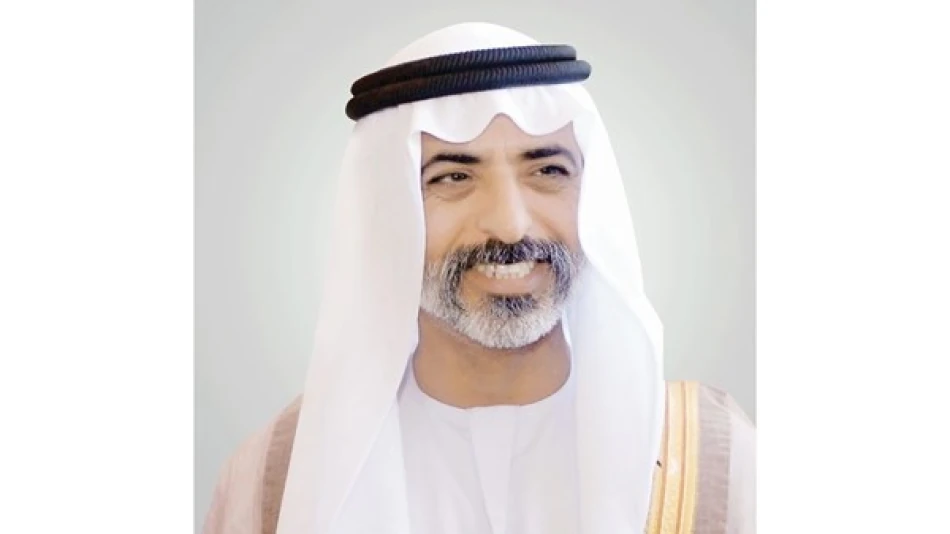
Emirati Youth Dedicated to Serving the Nation and Driving Its Developmental Journey
UAE Students Choose Nation Over Self: New Study Reveals Patriotic Career Priorities
A groundbreaking Dutch research study has revealed that the vast majority of Emirati university students prioritize serving their nation above personal gain when selecting their academic specializations. This finding, shared by Sheikh Nahyan bin Mubarak Al Nahyan, Minister of Tolerance and Coexistence, underscores a generational commitment to national development that could reshape the UAE's human capital strategy and economic diversification efforts.
Research Findings Signal Cultural Shift in Career Motivation
The Dutch researcher's field study surveyed Emirati university students about their academic choices and career aspirations. Unlike their counterparts in many Western nations who often prioritize salary potential or personal interests, Emirati students demonstrated an overwhelming desire to contribute to their country's developmental journey across various sectors including science, technology, and humanities.
Sheikh Nahyan attributed this mindset to the foundational values instilled by the UAE's founding father, Sheikh Zayed bin Sultan Al Nahyan, and reinforced today under President Sheikh Mohamed bin Zayed Al Nahyan. This represents a stark contrast to global trends where young professionals increasingly prioritize work-life balance and personal fulfillment over national service.
Strategic Implications for UAE's Vision 2071
This patriotic orientation among youth arrives at a critical juncture for the UAE's long-term economic strategy. As the nation pushes toward its Vision 2071 goal of becoming the world's best country by its centennial, having a generation committed to national service provides a significant competitive advantage over countries struggling with brain drain.
The findings emerged during a gathering for graduates of the fourth cohort of the "International Bridges" program, organized by the Nation Fund in collaboration with German industrial institutions. This program represents the UAE's systematic approach to developing local talent through international exposure while maintaining strong national loyalty.
International Bridges Program: A Model for Talent Development
The program's fourth iteration trained 25 Emirati students through six months of intensive training both domestically and in Germany. Unlike traditional exchange programs that often result in talent migration, this initiative appears designed to enhance local capabilities while strengthening ties to the homeland.
Yasser Al Qarqawi, Director General of the Nation Fund, emphasized that the program focuses on enabling graduates to either join the private sector or venture into entrepreneurship within the UAE. This dual-track approach addresses both immediate economic needs and long-term innovation requirements.
Comparative Analysis: UAE vs. Global Talent Retention
The UAE's approach contrasts sharply with challenges faced by other nations. While countries like India and China struggle with reverse brain drain as their educated youth migrate to Western nations, the UAE appears to have cultivated a generation that views international experience as preparation for domestic contribution rather than an escape route.
This mirrors Singapore's successful model from the 1980s and 1990s, where the government systematically sent students abroad with the expectation of return and national contribution. However, the UAE's approach appears more values-driven rather than contractually obligated.
Student Testimonials Reveal Program Impact
Sarah Abdullah Al Kathiri described her experience as a pivotal career moment that expanded her intellectual and professional horizons while reinforcing her commitment to diplomatic service. Her testimony suggests the program successfully balances international exposure with national loyalty.
Salem Mohammed Al Ketbi gained practical technical expertise in aircraft maintenance, non-destructive testing, and composite materials work. His focus on transferring knowledge to UAE colleagues demonstrates the program's effectiveness in creating knowledge multipliers rather than just individual beneficiaries.
Bashayer Al Hammadi developed skills in 3D modeling, welding, and complex electrical systems while emphasizing safety, organization, and teamwork in professional manufacturing environments.
Market and Investment Implications
For investors and businesses operating in the UAE, this generational commitment to national development suggests several opportunities. The combination of international training and domestic loyalty creates a skilled workforce that understands global standards while remaining committed to local market development.
This trend could accelerate the UAE's transition from a resource-based economy to a knowledge-based one, potentially making it more attractive for technology companies and advanced manufacturing operations seeking stable, skilled workforces.
The program's collaboration with German industrial leaders in energy, advanced technologies, aviation, and pharmaceuticals also signals the UAE's strategic focus areas for economic diversification. Companies in these sectors may find increasingly sophisticated local talent pools available for partnership and expansion.
Long-term Strategic Positioning
The research findings suggest the UAE has successfully navigated a challenge that has plagued many developing nations: how to provide world-class education and international exposure without losing talent to foreign markets. By cultivating patriotic motivation alongside professional competence, the UAE appears positioned to accelerate its development trajectory while maintaining cultural continuity.
This approach could serve as a model for other Gulf states and developing nations seeking to balance globalization with national development priorities. The key appears to be framing international experience as preparation for national contribution rather than personal advancement alone.
Most Viewed News

 Layla Al Mansoori
Layla Al Mansoori






